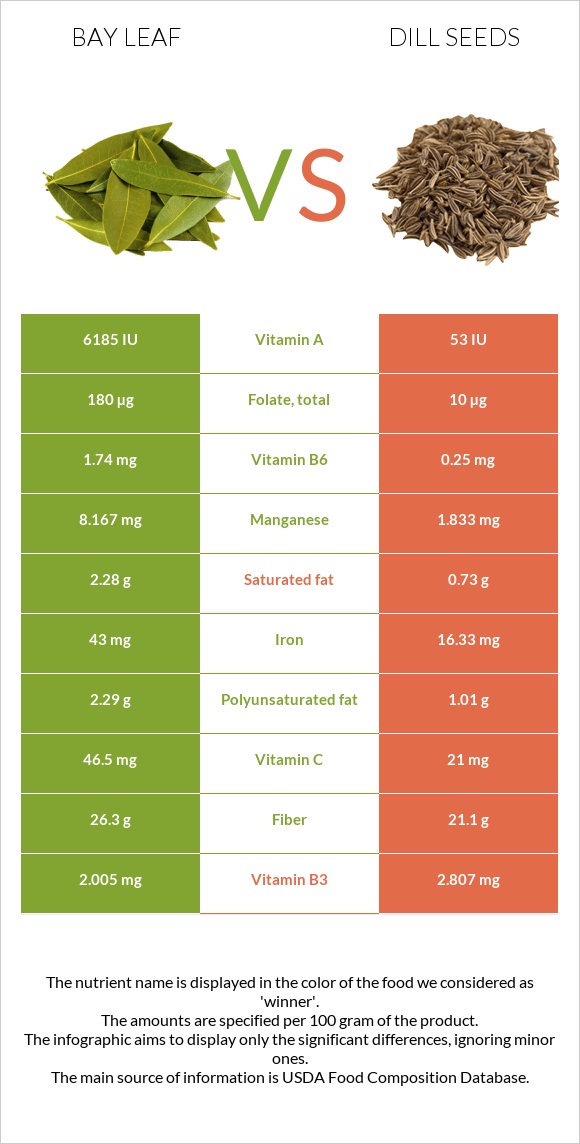Bay leaf vs. Dill seeds — In-Depth Nutrition Comparison
Compare
Significant differences between bay leaf and dill seeds
- Bay leaf has more iron, manganese, vitamin A, vitamin B6, folate, and vitamin C; however, dill seeds are richer in calcium, copper, vitamin B1, and magnesium.
- Bay leaf covers your daily iron needs 333% more than dill seeds.
- Dill seeds have 117 times less vitamin A than bay leaf. Bay leaf has 6185 IU of vitamin A, while dill seeds have 53 IU.
Specific food types used in this comparison are Spices, bay leaf and Spices, dill seed.
Infographic

Infographic link
Mineral Comparison
Mineral comparison score is based on the number of minerals by which one or the other food is richer. The "coverage" charts below show how much of the daily needs can be covered by 300 grams of the food.
| Contains more IronIron | +163.3% |
| Contains more ManganeseManganese | +345.6% |
| Contains more MagnesiumMagnesium | +113.3% |
| Contains more CalciumCalcium | +81.8% |
| Contains more PotassiumPotassium | +124.2% |
| Contains more CopperCopper | +87.5% |
| Contains more ZincZinc | +40.5% |
| Contains more PhosphorusPhosphorus | +145.1% |
| Contains less SodiumSodium | -13% |
| Contains more SeleniumSelenium | +332.1% |
Vitamin Comparison
Vitamin comparison score is based on the number of vitamins by which one or the other food is richer. The "coverage" charts below show how much of the daily needs can be covered by 300 grams of the food.
| Contains more Vitamin CVitamin C | +121.4% |
| Contains more Vitamin AVitamin A | +10200% |
| Contains more Vitamin B2Vitamin B2 | +48.2% |
| Contains more Vitamin B6Vitamin B6 | +596% |
| Contains more FolateFolate | +1700% |
| Contains more Vitamin B1Vitamin B1 | +4544.4% |
| Contains more Vitamin B3Vitamin B3 | +40% |
All nutrients comparison - raw data values
| Nutrient |  |
 |
DV% diff. |
| Iron | 43mg | 16.33mg | 333% |
| Manganese | 8.167mg | 1.833mg | 275% |
| Vitamin B6 | 1.74mg | 0.25mg | 115% |
| Calcium | 834mg | 1516mg | 68% |
| Folate | 180µg | 10µg | 43% |
| Copper | 0.416mg | 0.78mg | 40% |
| Vitamin A | 309µg | 3µg | 34% |
| Vitamin B1 | 0.009mg | 0.418mg | 34% |
| Magnesium | 120mg | 256mg | 32% |
| Vitamin C | 46.5mg | 21mg | 28% |
| Phosphorus | 113mg | 277mg | 23% |
| Fiber | 26.3g | 21.1g | 21% |
| Potassium | 529mg | 1186mg | 19% |
| Monounsaturated fat | 1.64g | 9.41g | 19% |
| Protein | 7.61g | 15.98g | 17% |
| Selenium | 2.8µg | 12.1µg | 17% |
| Zinc | 3.7mg | 5.2mg | 14% |
| Vitamin B2 | 0.421mg | 0.284mg | 11% |
| Fats | 8.36g | 14.54g | 10% |
| Polyunsaturated fat | 2.29g | 1.01g | 9% |
| Carbs | 74.97g | 55.17g | 7% |
| Saturated fat | 2.28g | 0.73g | 7% |
| Vitamin B3 | 2.005mg | 2.807mg | 5% |
| Calories | 313kcal | 305kcal | 0% |
| Protein per 100 calories | 2.4313099041533546g | 5.239344262295082g | N/A |
| Calories per 10 g protein | 411.30091984231274kcal | 190.8635794743429kcal | N/A |
| Net carbs | 48.67g | 34.07g | N/A |
| Sodium | 23mg | 20mg | 0% |
| Threonine | 0.575mg | 0% | |
| Isoleucine | 0.767mg | 0% | |
| Leucine | 0.925mg | 0% | |
| Lysine | 1.038mg | 0% | |
| Methionine | 0.143mg | 0% | |
| Phenylalanine | 0.67mg | 0% | |
| Valine | 1.12mg | 0% | |
| Histidine | 0.32mg | 0% |
Macronutrient Comparison
Macronutrient breakdown side-by-side comparison
Protein:
7.61 g
Fats:
8.36 g
Carbs:
74.97 g
Water:
5.44 g
Other:
3.62 g
Protein:
15.98 g
Fats:
14.54 g
Carbs:
55.17 g
Water:
7.7 g
Other:
6.61 g
| Contains more CarbsCarbs | +35.9% |
| Contains more ProteinProtein | +110% |
| Contains more FatsFats | +73.9% |
| Contains more WaterWater | +41.5% |
| Contains more OtherOther | +82.6% |
Fat Type Comparison
Fat type breakdown side-by-side comparison
Saturated fat:
Sat. Fat
2.28 g
Monounsaturated fat:
Mono. Fat
1.64 g
Polyunsaturated fat:
Poly. Fat
2.29 g
Saturated fat:
Sat. Fat
0.73 g
Monounsaturated fat:
Mono. Fat
9.41 g
Polyunsaturated fat:
Poly. Fat
1.01 g
| Contains more Poly. FatPolyunsaturated fat | +126.7% |
| Contains less Sat. FatSaturated fat | -68% |
| Contains more Mono. FatMonounsaturated fat | +473.8% |





